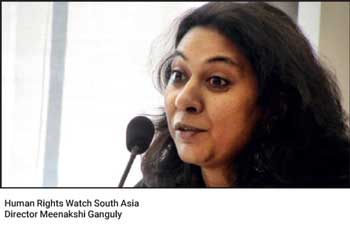Monday Feb 16, 2026
Monday Feb 16, 2026
Saturday, 1 April 2023 00:06 - - {{hitsCtrl.values.hits}}
 The Government of Sri Lanka should ensure that policies to enhance revenues do not further erode economic and social rights and that anti-corruption reforms provide accountability, Human Rights Watch said this week.
The Government of Sri Lanka should ensure that policies to enhance revenues do not further erode economic and social rights and that anti-corruption reforms provide accountability, Human Rights Watch said this week.
The international human rights defenders said although the loan focuses on growing revenues and emphasises tackling corruption and improving social protection, the program as structured risks further undermining people’s economic and social rights.
According to the organisation, Government policies that effectively reduce salaries in public service agencies, eliminate subsidies and increase regressive taxes could degrade public services and further raise prices at a time when a large segment of the population is already struggling due to high inflation.
“Official corruption and tax rules that benefitted the wealthiest were key drivers of Sri Lanka’s economic crisis, for which Sri Lankans struggling to make ends meet should not have to carry the burden,” the Human Rights Watch South Asia Director Meenakshi Ganguly said.
“The Government should recognise that the public deserves real accountability, whether it’s for past war crimes or ongoing misgovernance and repression of critics,” she added.
Human Rights Watch also said civil society should play a prominent role in the IMF reforms process and subsequent anti-corruption reforms should ensure that the Government enforces its rules and holds corrupt officials and private businesspeople to account, including for past malfeasance. It added that these efforts should include recovering stolen assets, imposing back pay and penalties for tax evasion, and stemming illicit financial flows out of the country. The program’s focus on increasing Government revenues, rather than reducing public spending as a percentage of Gross Domestic Product (GDP), will better protect rights, Human Rights Watch said.
While noting that the IMF program includes other measures that could harm low-income people, the organisation noted that when removing subsidies and introducing taxes for fossil fuels, the Government should adequately invest in social protection, the use of renewable energy sources, and other measures to move toward a rights-aligned economy in order to protect rights of the people.